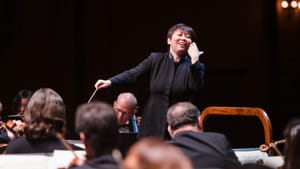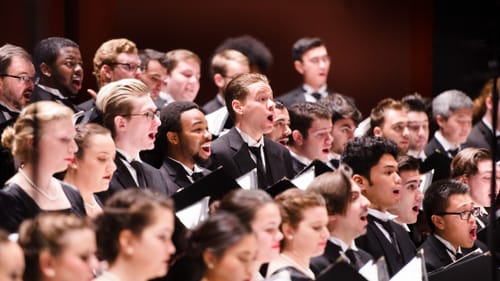Stay in the Loop
BSR publishes on a weekly schedule, with an email newsletter every Wednesday and Thursday morning. There’s no paywall, and subscribing is always free.
Never better timing
Xian Zhang conducts the New Jersey Symphony Orchestra: Beethoven's Symphony No. 9

It’s been a harrowing two weeks, but this week, in Newark’s New Jersey Performing Arts Center (NJPAC), Xian Zhang, music director of the New Jersey Symphony Orchestra, led three performances of a program of transformative power, rising above politics, embracing diversity and hope.
The big draw for this program was the Ninth Symphony in D minor by Beethoven. I think it’s no exaggeration to say this work is associated, like no other, with freedom and justice. But Zhang also keenly selected two additional works of complementary focus to start the program.
Words that resonate
The first of these works is the U.S. premiere of Kate Whitley’s “Speak Out,” a setting for full orchestra. It includes a youth chorus of remarks made by Malala Yousafzai at the United Nations General Assembly in 2013. Yes, you are getting the picture: female conductor, female composer, female author.
Malala’s words leaped out of the printed program as I read it just hours after watching a bevy of TV commentators on Judge Brett Kavanaugh's Supreme Court appointment.
Here I stand, one among many
I speak not for myself, but for those without voices
We realise the importance of our voice when we are silenced
And of that silence comes thousands of voices...
Today is the day we speak out.
Musically, the work is richly scored, with great feeling and warm tonality. It emulates a tropical garden in bloom, with cascades of shimmering strings falling like rain and patches of dense orchestration that open up like flowers. Tones wander between the singing of the New Jersey Youth Chorus, led by Trish Joyce; the Montclair University Singers; and the orchestra. The entire work ends on a whisper, a note of tentative hope.
The second work was “Lyric for Strings,” a haunting elegy by African-American composer George Walker, who died this summer at age 96 in Montclair, New Jersey. The work, which had its world premiere at the Curtis Institute of Music in 1946, also ends on a note of gentleness and grace.

Back to basics
This is certainly not the case with the program’s major work, Beethoven’s Symphony No. 9. It’s always a festive affair when the Ninth, with its leviathan musical resources, takes over a concert hall.
NJPAC is up to the challenge, physically, acoustically, and aesthetically. But even more important are the emotional, intellectual, and technical musical resources of the conductor and performers, and the way these all weave together to form a work of art that can change the way we think about our world.
The Ninth is so monumental and weighted down by the responsibilities imposed on it by generations of critics that we tend to forget its essential messages. The first, to slightly update Friedrich Schiller’s poem sung in the final movement, is that all humans are brothers and sisters. The second is that joy is our birthright.
More than in any of the other performances I’ve attended, NJSO brought this joy to every beat. Several violinists actually beamed as they played, Maestro Zhang wore an encouraging smile, and the female soloists were radiant. I don’t know whether this was a strategy to inspire performance, but it certainly conveyed a meaning beyond pure music that made this performance magical.

"No more of these sad notes"
Zhang is an extraordinary conductor, unfolding the majesty and mystery of this work with singing clarity. Using a baton, she conducts with her entire body, arms moving so rapidly at times they become a blur or sweep down, almost touching the floor. Her direction is precise and her command of these powerful musical forces is absolute.
Each section of each movement received her complete attention, resulting in a well-balanced performance. For my taste, the third movement (60/quarter) seemed a bit brisk, but the achingly beautiful melody and its permutations remained uncompromised.
The final movement, of course, is beyond verbalization. The four soloists were memorable: Mary Elisabeth Williams, soprano; Elizabeth Bishop, mezzo-soprano; Lorenzo Decaro, tenor; and Reginald Smith Jr., baritone.
You could not have asked for a stronger, more resonant voice than Smith’s as he admonished the orchestra in German, “Friends, no more of these sad notes! Let’s raise our voices in more joyful sounds.”
A diverse chorus included the Montclair State University Singers and Chorale, and Newark Voices (in the Friday and Sunday performances only), led by Heather J. Buchanan. According to the program, Newark Voices is a project-based community choir formed to engage singers and choral musicians from Greater Newark. In terms of this work, the project was a success.
This is the future of classical music — and it does have a future — bringing us beauty, challenge, hope, and community even in times of gravest despair, as we face the perils of our time and years to come. It is a face of diversity: color, gender, LGBTQ+, recreating some of humanity’s greatest music and crafting new music for the audiences of tomorrow.
The New Jersey Symphony got it right, and their timing couldn’t be better.
What, When, Where
Zhang Conducts Beethoven 9. Mary Elizabeth Williams, soprano; Elizabeth Bishop, mezzo-soprano; Lorenzo Decaro, tenor; Reginald D. Smith Jr., baritone; Montclair State University Singers; Montclair State University Chorale; Newark Voices; New Jersey Youth Chorus; Xian Zhang, conductor. "Speak Out," by Kate Whitley; "Lyric for Strings," by George Walker; and Symphony No. 9 in D minor, Op.125, by Ludwig van Beethoven. October 5-7, 2018, at the New Jersey Performing Arts Center, 1 Center Street, Newark, New Jersey. (800) 255-3476 or njsymphony.org.
Sign up for our newsletter
All of the week's new articles, all in one place. Sign up for the free weekly BSR newsletters, and don't miss a conversation.

 Linda Holt
Linda Holt